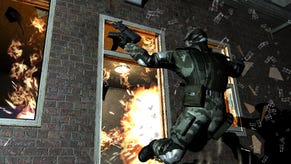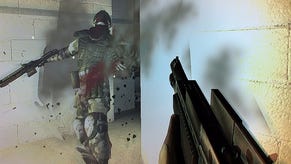There's been a lot of talk about Aliens versus Predator 3 and...
No no! My question's not to do with AVP3. It's: to what extent were you motivated by your experiences with Aliens versus Predator 2 in making
F.E.A.R.?
I'd actually say not at all. The core concept for F.E.A.R came right after Shogo, and the core concept was really simple: to make an action movie in a first-person shooter, where you really feel like an action star - and I'm sure a lot of first-person shooters start with that same core concept. The team that made No One Lives Forever was the same that made Shogo, so they took that core concept and turned it into NOLF. So you can see where you can end up just by starting with that same core concept and making a few little tweaks, because we started with the same core concept and ended up with F.E.A.R. The supernatural aspect was the twist to the core concept, just as the 60s spy was the twist on NOLF. It was a different team that did AVP2. Now we can look back at it and identify similarities, but it wasn't really a motivator for F.E.A.R.
Which aspect is more important - the action or the supernatural?
Action.
...because you look at the multiplayer and the supernatural stuff's gone out of the window.
It's action. Its core is action. We started with "action movie" - that was the core concept. That also comes back to what's important to the gamer. With me, as a gamer, I'm always talking about the gameplay. So action was the core. The supernatural only really comes into play with the story, so if you're into your story, character development and so on - something that we take very seriously at Monolith - then you're probably going to be more interested in the supernatural aspect of it.
Will all the action be in such enclosed areas?
There are some outside areas.
It's not all in the one building, then?
No.
Can you give us any examples?
No.
Sorry!
Why the slow motion?
The core has always been combat and in particular cinematic combat. We wanted to capture an action movie; that's why we always emphasize movie. We want to capture what an action movie feels like, but in a game. The slow-mo actually came to us when we were working on the effects and we were looking at what you actually do in an action movie that's cool. The concept of slowing down time is done in virtually every action movie since way before The Matrix; it's been done forever. That was something where the lead designer said, "It'd be cool to try this; this is something I've wanted to try for a long time. Let's try it; no one's really done it in a first-person shooter before and you know it works in
Max Payne, so let's see if it works in a first-person shooter." And so we implemented it and the team fell in love with it, and so we said we'd keep it.
Is it just a gameplay mechanic or is it justified in the story?
It's both I would argue. It started as a gameplay mechanic - definitely. Once we realised we wanted this gameplay mechanic we asked ourselves whether we could put it in or should we just leave it, so there was always that internal debate: does it need to make sense or is it enough that it's just a cool gameplay mechanic? It does fit in to the story and I would argue that the player can decide on their own whether it fits or not. I'd rather not say that it's this perfect marriage of game design and gameplay; the core was for gameplay.
Can you say anything about the background of the in-game team?
That'll all come out in the story. But the core concept is that you're the leader of this elite group that is made up to handle situations where the normal Delta Force can't handle the situation.
Is it true that it's going to be set over 12 hours of real time? And is that the game length or...?
12 hours is the concept. This is a day where you start in evening and events unfold over 12 hours or so. We really wanted the player to feel immersed, that you're in this action movie and it's you. It's you as the player, not as a character. You're not playing this guy Joe and he has this whole background; we want the player to start without a background and we're actually going to use the idea that you don't know your background as part of the story. If you pass by a mirror you're going to see a mask because we want the person playing to never for a second doubt that they're in the game. That's the goal.
Why did you choose a Japanese style of horror compared to, say, Aliens versus Predator 2 which is much more Western in its approach?
That's easy. The lead designer believes - and I totally agree with him - that it's scarier.
Why?
It just is. Have you seen those movies?
I'm not an authority, but every Japanese horror movie I've seen revolved around ghosts and I think there's something about ghosts that's just scary. Ghost stories have been around forever and I think Hollywood hasn't focused on ghosts until relatively recently. They want monsters. And I think it's pretty easy to see the strings on monsters and not be scared by them. But something that's basically human or was human is scarier to people, I think. It's more believable on some level. No one knows what happens when you die; maybe there are ghosts.
Are you going to stick to the understated narrative, where you always hint at things rather than stating them outright?
I think atmosphere is huge. I think 95 per cent of being afraid is your imagination. Hinting at things is a really good technique because what you think is going to happen is different than what somebody else thinks is going to happen and you're both going to think the thing that scares you the most - and we can't always guess that ourselves. Once we show you the monster; once you pull back the curtain, it's not scary any more. I think that's something that goes back to your question about Japanese horror movies. They do a great job when they don't show you. You see things and it's kind of blurry and you're asking yourself, "What is that? Is it a girl? Is that her hair?" It's much scarier not to know.
It sounds like that's the approach you're using for the entire game.
Pretty much. It's a really good technique. There'll be things you see. It only works so long, because after a while you're thinking, "Okay it's a shadow; I'm not scared." At some point you have to show what the shadow is.
Which movies influenced you the most?
Ah... The whole Ring series, The Eye, The Grudge... There's a whole lot. This is really a lead designer question. I mean, I talk to him a lot so I do know the movies that influenced him but at the same time he's a huge movie buff so there's a bunch of movies that he's been influenced by.
Japanese horror and Hong Kong action?
Mainly. There are also some Korean ghost stories too.
Dark Waters and things like that?
Yeah, Dark Waters is definitely one. That's a good movie.
Dark Waters was the one with the people and the shark and...
OPEN Water was the one with the people and the shark and...
Why have you dropped the Lithtech engine after all these years? Is it not going to be used again?
It's technical. Basically we branched Lithtech away from Monolith and they have become a licensing arm called Touchdown - they renamed themselves - and so at some point around 2001 there was a migration of engineers from Lithtech back to Monolith. Some, not all. We reabsorbed those engineers and built the new technology, so for some time Monolith has been building what's called the Lithtech engine. The F.E.A.R engine was a bigger departure because we rewrote so much of it, but there are things in there that are Lithtech.
Are you calling it the F.E.A.R engine?
We call it the F.E.A.R engine, but I actually don't like to use the term 'engine' because I don't think that's broad enough; I call it the F.E.A.R technology because it includes all the tools, game code, etc. Usually when people talk about the engine they're actually talking about the renderer, which is 10 per cent of the code base and is just what people like to talk about. And, actually, with newer renderers it's becoming smaller. So I personally don't like to focus on that. But as far as the name goes, if Touchdown licenses the technology they can call it whatever they want; I think they'll call it the F.E.A.R technology but we don't have control.
This is just the start then. We're going to see it appear in more games and so on.
It could. Monolith doesn't control that. We have a deal with Touchdown Entertainment and they can license the technology if they choose to. I'm pretty sure there'll be interest.
Does it migrate to consoles at all?
We do have a version of this technology that's working on a next-generation console?
If you can run it on next-generation technology, does that mean you have next-gen dev kits and that you're working on something?
You'd think so!
Yeeeeah.
I should just mention that we have multiple game teams and there is a game coming up that hasn't been announced.
Not from us!
That's just my shameless plug for Monolith. And that'll answer your question actually.
Will you play alongside AI controlled characters at any point?
There are places in the game where you have your partners. It isn't something that we want to focus on because then you have to control them and it becomes a problem, and I would say what we have is closer to scripted scenarios. When the game is close to a pivotal story point you might get to play with another character.
So it's not like
Half-Life 2 where you can order them to...
...get stuck behind you in hallways? No.
Heeeeey now!
Are you including any on-rails shooting sequences, for example in a helicopter?
Potentially.
I'll interpret that as a yes.
Do you gain any new abilities as you're going through the game?
That's a good question... I can't actually answer it though because I don't know. I know we've talked about that but I don't think it made it into the game.
You've worked on a fairly broad range of stuff. How difficult was it to put together something like F.E.A.R compared to something like Matrix Online?
I haven't actually worked on Matrix Online; that's another division. If you go down my list, they are all shooters except for Claw. Our approach at Monolith and something I push really hard is iteration, and we're always iterating on the technology and from game to game. For me there's aspects of it that are really easy because we've done them lots of times before, and then there's always something new that's really hard. For F.E.A.R... The hardest part about this technology, as John Carmack said, is the content creation because it's really, really slow. Even comparing this to SWAT 4 [the other game on display that day], the detail on there is extremely high in SWAT 4 because it's last-generation technology. With next-generation technology every game you see is going to have less detail because it's too expensive to go crazy until the tools and everything get up to the point where we can do the same sort of detail. If you look back at older technology it's the same thing, and you could compare something like Doom 1 to SWAT 4 even though there's order of magnitudes more detail.
Have you never wanted to work on anything besides FPS games?
I'm sure other developers have different thoughts on this, but I personally feel that whatever you work on you kind of ruin for yourself because you can't help analysing it. Half-Life 1 was one of my favourite games and I play Half-Life 2 and I'm just analysing it the whole time. I can't just play it. And it sucks; I hate that. So I personally would not want to work on other kinds of games because I don't want to ruin them.
So you're saying you don't like shooters?
No, I like shooters. I still like them, but I can't approach it as I used to as a games-player when I didn't think about how things actually worked. Now I'm always wondering how they did something. But if I play something like
Diablo II, which is my all-time favourite game, I don't think that way; I'm just a gamer hacking away and clicking.
How advanced is the AI?
I would say our AI is the most advanced AI in a first-person shooter ever. I would go out on a limb and say that. And the reason I feel I can say that is because of the iteration once again. We first started experimenting with goal-based AI at the end of NOLF1, so that was 2000, and we've iterated on that concept and scrapped AI systems, rewritten AI systems, had the same AI engineer working on it for the last three years and we've done many iterations. One example of this iteration is... Most first-person shooters still use a node-based path system where you drop the nodes down, and we used that in NOLF1. In NOLF2 we went to a volume-based approach where you placed volumes and any place in the volume the AI can move, which gives way more freedom to the AI and to the level designers in how they set up their AI. In F.E.A.R we've gone to a navigation mesh system where they can actually lay down polygons that say "Anywhere in these polygons the AI can go." It's almost to the point where you don't even have to say where the AI can go; they can figure it out for themselves. The AI can just travel wherever they want. That's one example. It's just pathing, but most first-person shooters are still two generations back, and we've got that on all the AI systems. So yes, it's advanced AI. [Smiles]
Is there anything in there to make them work with each other?
Yep. It's harder to see in the E3 demo because a lot of that comes back to level designers having to specify. They have to give them hints. They're not full artificial intelligence. The designers have to say, "This is a column here, so you can take cover here or whatever." If they have hints in the environment they can know how to approach where the player is and so when the player's behind a pole they can know to flush them out. And depending on the number of AI, if one guy's hurt he's not going to attack; he's going to look for some first-aid to get better. He doesn't really heal, but he'll go to some place he's not going to get shot. So as far as working together, he might ask for cover fire.
So if there were two and we were firing at one of them, the other might try and get behind us?
Oh definitely. There's definitely flanking. Actually, the hard thing about that is that it's really easy to make AI that's hard, and if your AI is always flanking it's just not fun. Then it becomes four against one and you just die. It gets really hard. I think the key is to make it fun but keep the AI intelligent, and that's the tricky part. Fun always comes first. A lot of times there are things the AI could do that are really intelligent but we decide not to do it because the player is just going to think it's cheap. We always err on the side of what's fun.
Guys, it's going to have to be just one more question...
If the code we just saw is from E3 last year, how far has the game moved on?
It's about 10 months old, something like that. I think the biggest thing, without giving away too much, is that you only saw two AI types, so there's more variety. There's other AI. That's one thing. And for the last month the AI engineer hasn't been adding features; all he's been doing is making them more fun. He's gone in, also fixing bugs obviously, and found systems he's made that the level designers aren't using and going and talking to the level designers and recommending they make use of them. There's a lot of iteration. I can't emphasize that enough. I think where you really get the polish and the fun in a game is through iterating over it to make it better.





